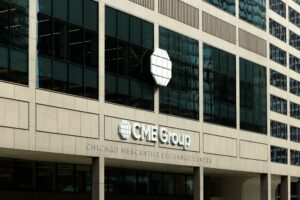Yesterday, the Dow Jones (US30) fell by 0.52% on Thursday. The S&P 500 (US500) dropped by 0.28%. The tech-heavy Nasdaq (US100) closed 0.08% lower. Market sentiment worsened due to a government shutdown, which delayed the release of key economic data. This caused investor focus to shift to the upcoming third-quarter earnings reports, offering insight into the state of the economy, and to AI-driven growth. Shares of Apple, Alphabet, Tesla, and Walmart all lost more than -0.7%, while PepsiCo rose by 4.2% after reporting higher-than-expected revenue and profit. Delta Air Lines jumped 4.3% on optimistic guidance, Nvidia added 1.8% after the US approved billions of dollars in chip exports to the UAE, and Costco climbed 3.1% on strong September sales.
The Canadian dollar weakened to a level above 1.400 per US dollar, hitting its lowest level since early April amid a stronger dollar and lower oil prices. In Canada, attention turns to Friday’s official September jobs report, which is expected to show further labor market softening with the unemployment rate rising from 7.1% to 7.2%. This data could provide new insight into the Bank of Canada’s rate-change prospects.
Mexico’s annual inflation accelerated for the second consecutive month, reaching 3.76% in September 2025, up from 3.57% in August, though still within the central bank’s 2-4% target range. Analysts had anticipated a slightly higher figure of 3.79%. Every month, consumer prices rose by 0.23% after a 0.06% increase in August, compared to market estimates of 0.27%.
European equity markets were mostly down yesterday. Germany’s DAX (DE40) gained 0.06%, France’s CAC 40 (FR 40) closed down 0.23%, Spain’s IBEX35 (ES35) fell by 0.60%, and the UK’s FTSE 100 (UK100) closed down 0.41% on Thursday. European stocks fell from record highs on Thursday. European banks lost over 1%, driven mainly by the drop in HSBC, whose shares fell by 4.5% after announcing a proposal to privatize its 63% owned Hong Kong subsidiary, Hang Seng Bank. Luxury and consumer goods stocks also took a hit: Ferrari plunged 15% after slashing its full-year and 2030 forecasts and cutting its electric vehicle sales targets, while LVMH, Hermès, and L’Oréal fell 2.6%, 2.2%, and 1.7%, respectively. Today, the focus was on France as President Macron pledged to name a new Prime Minister within 48 hours following the resignation of Sebastien Lecornu, amid calls to avoid appointing another centrist ally.
The spot price of silver jumped more than 4% to a record high of $51 per ounce, surpassing the previous peak recorded during the Hunt brothers’ market squeeze in 1980, as strong safe-haven demand met limited supply. The precious metal has surged over 70% this year, outperforming gold. This surge is driven by concerns over US financial risks, the possibility of interest rate cuts, questions about the Federal Reserve’s independence, and unsustainable levels of global deficits and debt. A shortage of freely available silver in the London market is providing further support for prices.
The US natural gas prices dropped to around $3.3 per million British thermal units (MMBtu), retreating from an 11-week high following a larger-than-expected inventory build. The US Energy Information Administration reported a storage injection of 80 billion cubic feet (bcf) for the week ending October 3rd, exceeding the forecast of 77 bcf and slightly above last year’s 78 bcf, though below the five-year average of 94 bcf.
Asian markets were mostly up yesterday. Japan’s Nikkei 225 (JP225) rose by 1.77%, China’s FTSE China A50 (CHA50) gained 0.85%, Hong Kong’s Hang Seng (HK50) declined 0.29%, and Australia’s ASX 200 (AU200) posted a positive result of 0.25%.
The Australian economy is performing well with inflation within the central bank’s target range (2-3%) and the labor market remaining resilient, Governor Michele Bullock told a parliamentary committee on Friday. Household consumption is growing, offsetting weaker government demand and supporting growth. Last month, the Reserve Bank left interest rates at 3.6% after three cuts since February. Bullock noted that services inflation remains “sticky” and highlighted global uncertainty, including US protectionist policies, geopolitical tensions, and slowing Chinese demand. However, the worst-case scenarios for tariffs have not materialized.









